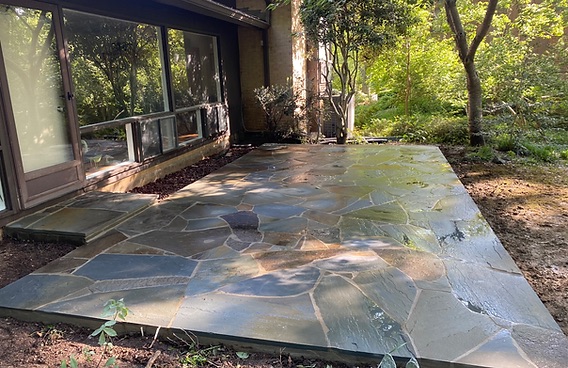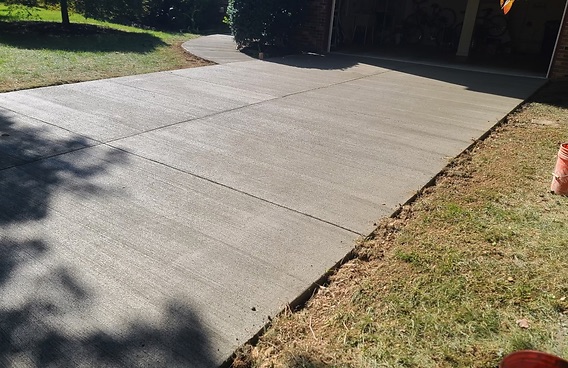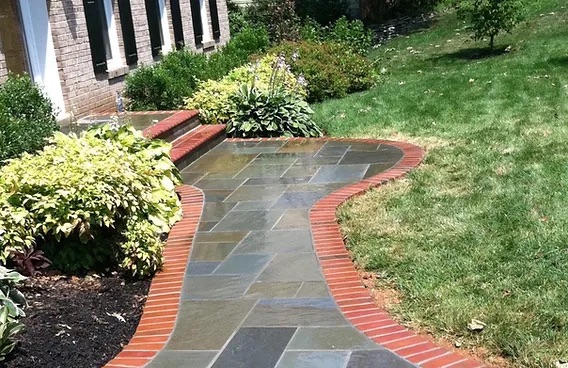Services
Decorative Concrete Overlays
Mimics the look of materials like brick, stone, or tile by pressing patterns into the wet concrete overlay. It’s a popular choice for driveways, patios, and walkways.
Applied using a spray gun, this overlay creates a textured surface that can resemble materials like stucco or rough stone. It’s often used for pool decks, outdoor patios, and sidewalks.
A thin layer of cementitious material applied to create a smooth, durable surface. It can be stained or dyed to achieve various colors and patterns, making it suitable for indoor floors and countertops.
Similar to stamped concrete but uses pre-cut stencils to create intricate designs or patterns on the surface. It’s a popular choice for decorative borders, logos, or personalized elements.
Garage Floor Epoxy
These systems consist of a base coat of epoxy followed by the application of decorative vinyl flakes. The flakes not only add visual interest to the floor but also provide texture and slip resistance. Once the flakes are applied, a clear topcoat of epoxy is added to seal and protect the surface. Decorative epoxy flake systems are a popular choice for residential garages, commercial spaces, and showroom floors.
Pool Deck Resurfacing
Spray texture coatings are applied using a spray gun to create a textured surface that enhances traction and prevents slips around the pool area. These coatings can be customized with various colors and additives to achieve the desired texture and appearance.
Acrylic coatings are a popular choice for pool deck resurfacing due to their durability, flexibility, and UV resistance. These coatings are applied as a thin layer over the existing surface and can be customized with various colors, textures, and patterns. Acrylic coatings provide a smooth and comfortable surface that is easy to maintain and resists fading and staining.
Paver/Stone Sealing
Polyurethane sealers create a durable and long-lasting film that offers superior protection against stains, chemicals, and abrasion. They are ideal for high-traffic areas and commercial applications but may be more expensive than acrylic sealers.
Enhancing sealers are designed to deepen the color and enhance the natural beauty of the pavers or stone. They protect against stains and moisture while intensifying the colors and textures of the surface. Enhancing sealers are commonly used on natural stone, such as travertine, slate, and limestone, to bring out the richness of the stone.
Wet-look sealers create a glossy, wet appearance on the surface of the pavers or stone, enhancing the color and depth of the material. They provide excellent protection against stains, UV damage, and moisture while adding visual appeal to outdoor spaces. Wet-look sealers are available in solvent-based or water-based formulas and can be used on various types of pavers and stone surfaces.
Also known as impregnating sealers, penetrating sealers are absorbed into the pores of the pavers or stone, forming a protective barrier beneath the surface. They provide excellent protection against water penetration, oil stains, and UV damage while allowing the surface to breathe. Penetrating sealers are ideal for natural stone, concrete pavers, and porous materials.
Film-forming sealers create a protective film on the surface of the pavers or stone, offering enhanced protection against stains, moisture, and UV rays. They come in two main types:
Acrylic sealers form a glossy or matte film on the surface, enhancing the color and sheen of the pavers or stone. They provide good protection against water and UV damage but may require recoating every few years.

Matte Sealers
Matte sealers provide a natural-looking finish to the pavers or stone, without adding shine or gloss. They offer protection against stains, moisture, and UV damage while maintaining the original appearance and texture of the surface. Matte sealers are ideal for retaining the natural look of outdoor spaces while providing essential protection.
Commercial Epoxy Flooring
Solid epoxy flooring, also known as 100% solid epoxy, is a high-performance option ideal for heavy-duty industrial and commercial environments. It consists of pure epoxy resin without any additives, providing maximum durability, chemical resistance, and impact resistance. Solid epoxy flooring is commonly used in warehouses, manufacturing facilities, and automotive garages.
Self-leveling epoxy flooring is a seamless option that creates a smooth, level surface over uneven or damaged substrates. It’s applied as a liquid and spreads evenly to form a flat and uniform finish. Self-leveling epoxy is suitable for areas where hygiene and cleanliness are crucial, such as food and beverage processing plants, laboratories, and pharmaceutical facilities.
Epoxy mortar flooring is a heavy-duty option that combines epoxy resin with graded aggregates like quartz or silica sand to create a strong and impact-resistant surface. It provides excellent durability, chemical resistance, and thermal shock resistance, making it ideal for environments with high traffic, heavy machinery, and exposure to harsh chemicals. Epoxy mortar flooring is commonly used in commercial kitchens, breweries, and chemical processing plants.
Decorative epoxy flooring offers a combination of aesthetics and functionality, allowing businesses to customize their floors with various colors, patterns, and textures. It can mimic the look of natural materials like marble, granite, or terrazzo while providing the durability and performance of epoxy resin. Decorative epoxy flooring is popular in retail stores, hotels, restaurants, and corporate offices where design aesthetics are essential.
Antimicrobial epoxy flooring incorporates additives that inhibit the growth of bacteria, fungi, and mold on the surface, making it an ideal choice for healthcare facilities, laboratories, and cleanrooms. It helps maintain a sterile environment and reduces the risk of cross-contamination, ensuring compliance with hygiene standards and regulations.
Metallic Epoxy
Marbled metallic epoxy combines metallic pigments with multiple colors to create intricate, marble-like patterns and designs on the floor. This type of metallic epoxy allows for endless customization options, with swirls, veins, and organic shapes resembling natural stone. Marbled metallic epoxy is popular in interior design projects, including residential floors, lobbies, and reception areas, where a unique and visually striking floor is desired.
Industrial Epoxy Flooring
High-build epoxy flooring consists of multiple layers of epoxy resin applied to the substrate to create a thick, durable coating. It offers excellent abrasion resistance, impact resistance, and chemical resistance, making it suitable for industrial facilities, warehouses, and manufacturing plants with heavy traffic and machinery.
Self-leveling epoxy flooring is a seamless option that is poured onto the substrate and spreads evenly to create a smooth, level surface. It’s ideal for environments where hygiene and cleanliness are crucial, such as food and beverage processing plants, pharmaceutical facilities, and cleanrooms. Self-leveling epoxy provides a flat and uniform finish that is easy to clean and maintain.
Electrostatic dissipative (ESD) epoxy flooring is designed to control static electricity and prevent electrostatic discharge, making it suitable for environments with sensitive electronic equipment, such as electronics manufacturing facilities, server rooms, and data centers. ESD epoxy flooring helps protect equipment from damage caused by static electricity and ensures a safe working environment for personnel.
Chemical-resistant epoxy flooring is formulated to withstand exposure to harsh chemicals, acids, solvents, and oils commonly found in industrial settings. It provides a protective barrier against chemical spills, corrosion, and deterioration, making it ideal for laboratories, chemical processing plants, and wastewater treatment facilities. Chemical-resistant epoxy flooring helps maintain a safe and compliant work environment while extending the lifespan of the substrate.
Anti-slip epoxy flooring incorporates additives like quartz, aluminum oxide, or silica sand to create a textured surface that enhances traction and reduces the risk of slips and falls. It’s suitable for areas prone to wet conditions, such as loading docks, walkways, and manufacturing floors. Anti-slip epoxy flooring improves safety and reduces the likelihood of accidents in industrial environments.
Stained Concrete
Water-based staining involves applying water-based dyes or pigments to the concrete surface to achieve vibrant, opaque colors. Unlike acid stains, water-based stains do not rely on a chemical reaction and offer more control over color intensity and coverage. Water-based stain concrete provides a wide range of colors, including pastels, earth tones, and vibrant hues. It’s ideal for interior floors, countertops, and decorative concrete projects where precise color matching is desired.
Stamped and stained concrete combines the decorative effects of stamped patterns with the color enhancement of stains. After stamping the concrete with desired patterns like brick, stone, or tile, stains are applied to add depth and dimension to the surface. Stamped and stained concrete offers the look of natural materials with the durability and low maintenance of concrete. It’s commonly used for outdoor patios, pool decks, and walkways to create realistic and decorative surfaces.
Polished and stained concrete combines the sleek, glossy finish of polished concrete with the added color enhancement of stains. After polishing the concrete surface to a high sheen, stains are applied to achieve desired colors and effects. Polished and stained concrete offers a modern and sophisticated look suitable for commercial spaces, retail stores, and upscale residences. It provides durability, ease of maintenance, and aesthetic appeal in one flooring solution.
Overlay stained concrete involves applying a thin layer of overlay material, such as microtopping or self-leveling concrete, over the existing concrete surface before staining. This allows for repairing damaged or discolored concrete while adding color and texture with stains. Overlay stained concrete offers endless design possibilities, including custom patterns, logos, and graphics. It’s suitable for both interior and exterior applications, including floors, countertops, and decorative elements.
Wash and Seal
Acid staining involves applying acidic solutions, typically containing metallic salts, to react with the minerals in the concrete surface. This chemical reaction creates unique, mottled patterns and translucent colors that penetrate the concrete. Acid stain concrete offers a natural, variegated appearance with earthy tones like browns, greens, and blues. It’s suitable for interior and exterior applications, including residential floors, patios, and driveways.
Water-based staining involves applying water-based dyes or pigments to the concrete surface to achieve vibrant, opaque colors. Unlike acid stains, water-based stains do not rely on a chemical reaction and offer more control over color intensity and coverage. Water-based stain concrete provides a wide range of colors, including pastels, earth tones, and vibrant hues. It’s ideal for interior floors, countertops, and decorative concrete projects where precise color matching is desired.
Acetone dye staining involves using solvent-based dyes dissolved in acetone to penetrate and color the concrete surface. Acetone dyes offer fast drying times and deep penetration into the concrete, resulting in intense, translucent colors with a polished finish. Acetone dye stain concrete is popular for interior floors, retail spaces, and commercial environments where durability and aesthetics are essential.
Stamped and stained concrete combines the decorative effects of stamped patterns with the color enhancement of stains. After stamping the concrete with desired patterns like brick, stone, or tile, stains are applied to add depth and dimension to the surface. Stamped and stained concrete offers the look of natural materials with the durability and low maintenance of concrete. It’s commonly used for outdoor patios, pool decks, and walkways to create realistic and decorative surfaces.
Polished and stained concrete combines the sleek, glossy finish of polished concrete with the added color enhancement of stains. After polishing the concrete surface to a high sheen, stains are applied to achieve the desired colors and effects. Polished and stained concrete offers a modern and sophisticated look suitable for commercial spaces, retail stores, and upscale residences. It provides durability, ease of maintenance, and aesthetic appeal in one flooring solution.
Overlay stained concrete involves applying a thin layer of overlay material, such as microtopping or self-leveling concrete, over the existing concrete surface before staining. This allows for repairing damaged or discolored concrete while adding color and texture to stains. Overlay stained concrete offers endless design possibilities, including custom patterns, logos, and graphics. It’s suitable for both interior and exterior applications, including floors, countertops, and decorative elements.
Patio Coatings
Acrylic patio coatings are water-based coatings that provide a durable and slip-resistant finish for outdoor concrete surfaces. They are available in a variety of colors and textures, including smooth, textured, and stamped finishes. Acrylic coatings offer UV resistance, mildew resistance, and easy maintenance, making them suitable for residential patios, pool decks, and walkways.
Epoxy patio coatings are a durable and long-lasting option for outdoor concrete surfaces. They consist of epoxy resin mixed with decorative aggregates or flakes to create a seamless and waterproof finish. Epoxy coatings provide excellent protection against stains, chemicals, and abrasion, making them ideal for high-traffic areas like patios, driveways, and garage floors.
Polyurea patio coatings are fast-curing and flexible coatings that offer superior durability and chemical resistance. They form a seamless, waterproof membrane that protects the underlying concrete from moisture, UV exposure, and wear. Polyurea coatings are suitable for outdoor patios, balconies, and rooftop decks where weather resistance and longevity are essential.
Rubber patio coatings are made from recycled rubber granules mixed with a binder and applied as a textured surface over concrete. They provide cushioning, slip resistance, and impact absorption, making them ideal for outdoor play areas, sports courts, and pool decks. Rubber coatings are available in various colors and patterns to enhance the aesthetics of outdoor spaces.
Stamped concrete overlay is a decorative coating that mimics the appearance of natural materials like stone, brick, or tile. It involves applying a thin layer of concrete over the existing patio surface and stamping it with patterns to create texture and depth. Stamped concrete overlays offer endless design possibilities and can be customized with colors, stains, and sealers to achieve the desired look.
Textured concrete overlay is a versatile coating that adds texture and dimension to outdoor concrete surfaces. It can be applied as a thin layer over existing concrete and textured with brooms, rollers, or trowels to create a non-slip surface. Textured overlays are ideal for rejuvenating worn or damaged patios, sidewalks, and driveways while providing enhanced safety and aesthetics.
Epoxy Flooring
Experience the ultimate in flooring durability and design versatility with epoxy coatings, available in a wide range of colors and finishes to suit residential, commercial, and industrial applications.
Also known as 100% solid epoxy, this type of flooring consists of pure epoxy resin without any additives. Solid epoxy flooring offers maximum durability, chemical resistance, and impact resistance, making it ideal for heavy-duty industrial environments, automotive garages, and warehouses.
Water-based epoxy flooring is formulated with water as the primary solvent, making it environmentally friendly and low in odor. It provides a durable and seamless finish with excellent adhesion to concrete substrates. Water-based epoxy flooring is commonly used in residential garages, basements, and commercial spaces where VOC emissions need to be minimized.
Self-leveling epoxy flooring is a seamless option that is poured onto the substrate and spreads evenly to create a smooth, level surface. It’s ideal for environments where hygiene and cleanliness are crucial, such as food and beverage processing plants, laboratories, and healthcare facilities. Self-leveling epoxy flooring provides a flat and uniform finish that is easy to clean and maintain.
Decorative epoxy flooring offers endless design possibilities, allowing for customization with various colors, patterns, and textures. It can mimic the look of natural materials like marble, granite, or terrazzo while providing the durability and performance of epoxy resin. Decorative epoxy flooring is popular in residential homes, retail spaces, and commercial buildings where aesthetics are important.


